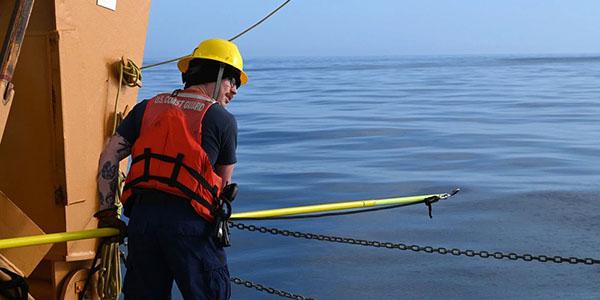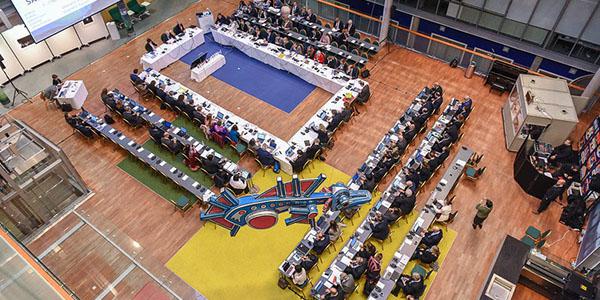Russia’s War Also Impacts Arctic Forum
Russia’s invasion of Ukraine has interrupted the meeting of the governing bodies that oversee coordination in the Arctic region, leaving discourse at a standstill, leaders from Arctic nations report. The unfortunate effect of global warming that has increased the polar ice melt is also making the Arctic region more navigable, and as such, the region is growing in geopolitical importance. To ensure open access and safe operations, several entities help govern the region but are not able to do so during the war.
“The Canadian Coast Guard is deeply involved in the multilateral forum in the Arctic,” said Chris Henderson, the Canadian Coast Guard’s deputy commissioner. “We work closely with other national coast guards on all interests and topics of mutual interest in the Arctic.
"I think it's worth saying, although it's pretty obvious, but the activities of both the Arctic Council and Arctic Coast Guard Forum have been put on pause due to the naked aggression of the Russians in Ukraine. All Arctic nations have disengaged from that very important work for the time being. With Russia being in the chair of the Arctic Council in the Arctic Coast Guard Forum, working through those bodies of course is a complete nonstarter for the time being.”
Canada’s Henderson; Adm. Linda Fagan, USCG, the U.S. Coast Guard's vice commandant; Rear Adm. Ewa Skoog Haslum, chief of the Swedish navy; Rear Adm. Ronald J. Piret, USN, commander, Naval Meteorology and Oceanography Command, U.S. Navy; and Denmark’s Rear Adm. Martin la Cour-Andersen, commander, Joint Arctic Command, discussed the geopolitics of the Arctic region April 4 during a panel at the Navy League’s Sea, Air, Space 2022 conference.
The moderator was Maj. Gen. Randy “Church” Kee, USAF (Ret.), senior adviser, Arctic Security Affairs, Ted Stevens Center for Arctic Security Studies, U.S. Defense Department. Gen. Kee began his Arctic Security Affairs adviser role last September and is working with partner nations “to ensure a stable, rules-based order in the Arctic that will benefit the United States and all Arctic nations,” according to the DoD.
Kee explained that the United States and other Arctic nations participate in various forums regarding the Arctic regions, including the aforementioned Arctic Council and Arctic Coast Guard Forum, and the Arctic Security Forces Roundtable.
The Arctic Council—whose mission as an intergovernmental forum is to promote cooperation in the Arctic region—is made up of Arctic states that have land or territories within the Arctic “and thus carry the role as stewards of the region,” according to the council. The council’s Arctic member states include: Canada; the Kingdom of Denmark, which also includes Greenland and the Faroe Islands; Finland; Iceland; Norway; the Russian Federation; Sweden; and the United States.
The Arctic Coast Guard Forum, meanwhile, is meant to be an independent and informal organization that is driven by operational needs “to foster safe, secure and environmentally responsible maritime activity,” in the region. The forum includes Canada, Denmark, Finland, Iceland, Norway, Russia, Sweden and the United States, of whose coast guard organizations may or may not be military-related.
Created 12 years ago by Norway and U.S. European Command (USEUCOM), the Arctic Security Forces Roundtable is the region’s sole military-related organization. The roundtable brings together senior leaders from European and North American nations to discuss various High North issues. Their last meeting, in November 2021, was hosted virtually by the German Ministry of Defense, with participation of America and leaders from USEUCOM, amongst other leaders. The group is embracing a “central goal of promoting a secure and stable Arctic region where nations work cooperatively to address shared challenges.”
That Russia’s invasion of Ukraine has halted the proceedings of the groups is a troubling factor, Denmark’s Adm. Martin la Cour-Andersen confirmed. “We are not, as Danes, naive or in any way complacent in terms of what we see. We live in a connected world—diplomatically, financially, militarily, politically—and there is a risk that the Russian aggression could end the unique era of low tension in the Arctic.
The Arctic governing organizations are needed, Adm. Fagan said, especially as the role of the region is changing. “My first trip to the Arctic was almost 37 years ago and what we see now is just an increasing pace of change,” said Adm. Fagan, who was just nominated to be the next commandant of the U.S. Coast Guard. “And you can't talk about the Arctic without talking about it in a competitive sense. Russia obviously has a lot of equities in the Arctic, and China has declared themselves as a near-Arctic state. Countering that activity and presence is an important role for the United States and the U.S. Coast Guard. We are an Arctic nation, and we need to ensure our safety and presence in that regard.”
Adm. Fagan’s identification of “access, competition and partnerships,” as being the three main operational paradigms for the Arctic also rings true for Sweden’s navy. “If you look at the map of Sweden, you see how close it is and how easy it is to reach northern parts of Norway and Russia,” Adm. Haslum said. “And in the Baltic Sea, you also have the Russian Baltic fleet so, for us in Sweden, it's very much about keeping the control, keeping the sea surveillance 24 hours per day. And of course, we do this together with our partners, contributing to the safety and security of the area.”
Sweden relies on cooperating agreements—bilateral, trilateral and multilateral constructs. “We do this all the time for both exercises and of course operationally as well,” she said. “We really need to work together, as it's very easy to impact the Arctic region, the far North Atlantic from the Baltic Sea. With the autocratic actors being present in the Arctic region, the Arctic members, we need to work against those actors from exploiting against purposes. It is very important for us to work together.”
Moreover, with the increased navigability of the region, the Arctic may see an increase in human activity. More people seeking recreation or adventure brings additional demands and risks, such as the need for more coast guard services, the vice commandant said.
“The human patterns of activity are definitely changing, at an accelerating pace… whether it's cruise ship activity, the challenges for the indigenous communities in subsistence hunting as the climate changes, as the ice retreats, some of the environmental impacts and human risk for search and rescue,” Adm. Fagan explained.
While the Arctic leaders joked that they hoped not to see stand-up paddle boarding in the area, given the deadly, frigid water temperatures, they acknowledged that the Arctic would see more visitors and traffic, and that steadfast cooperation was necessary amongst the arctic nations.
“There's no one nation that can address the challenges around the Arctic,” Adm. Fagan stated. “[We must] continue to invest in and value the partnerships. Those multilateral approaches to the number of the activities are essential.”





Comments